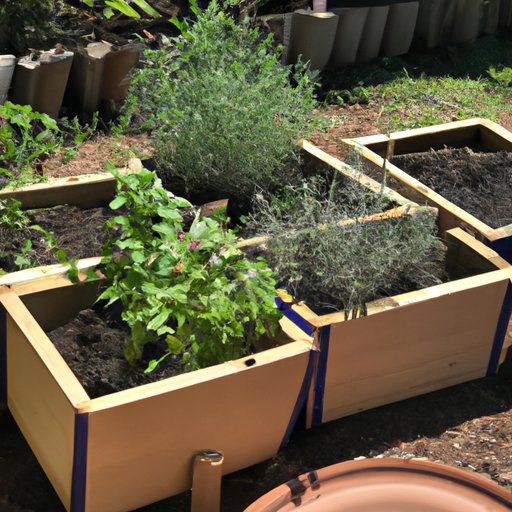Introduction
A herb garden is a great way to bring life to any outdoor space. Not only do they look beautiful and smell wonderful, but they can also be used for culinary, medicinal, and fragrant purposes. Growing your own herbs can have many benefits, from saving money on grocery bills to providing natural remedies for common ailments.
Gather the Essential Supplies
To get started, you will need some basic supplies. Containers or planters, soil, fertilizer, watering can, and gardening tools are all essential for a successful herb garden. Depending on the size and type of container you choose, you may also need potting mix or gravel.
Choose the Right Location and Soil
The next step is to find the perfect spot for your herb garden. Herbs require at least 6 hours of sunlight per day, so make sure to choose an area that gets plenty of sunshine. The type of soil you use is also important. Herbs prefer well-draining soil, so if you are using a container, make sure to use a potting mix specifically designed for herbs.

Research Which Herbs to Grow
Once you’ve chosen the right spot and soil, it’s time to decide which herbs to grow. There are many different types of herbs you can choose from, including fragrant herbs such as lavender and rosemary, culinary herbs like basil and oregano, and medicinal herbs like chamomile and peppermint. Pick a few that you think you’ll enjoy growing and using the most.
Plant the Herbs
Now that you’ve chosen your herbs, it’s time to get planting. Make sure to follow the directions on the seed packet for planting depth and spacing. If you’re using a container, make sure it’s big enough to accommodate the root system of the herbs you’re planting.
Provide Adequate Water
Once your herbs are planted, they will need regular watering to survive. The amount and frequency of watering will depend on the weather, the type of soil, and the size of the container. Generally speaking, herbs should be watered thoroughly once a week and more often in hot, dry weather.

Use Fertilizer and Pest Control
Using fertilizer and pest control products can help keep your herbs healthy and free of pests. Follow the instructions on the packaging for proper application. Be sure to check your plants regularly for signs of disease or pests, and take action as soon as you notice any problems.
Harvest and Enjoy!
Once your herbs are established, you can begin harvesting them. Timing is important, as some herbs are best harvested before flowering and others after. Once you’ve harvested your herbs, store them in airtight containers to preserve their flavor and aroma. You can then enjoy the fruits of your labor in the form of delicious meals or soothing teas.
Conclusion
Starting a herb garden is a rewarding experience that can benefit both you and the environment. With the right supplies, location, and soil, you can easily create a beautiful and productive herb garden.
(Note: Is this article not meeting your expectations? Do you have knowledge or insights to share? Unlock new opportunities and expand your reach by joining our authors team. Click Registration to join us and share your expertise with our readers.)
